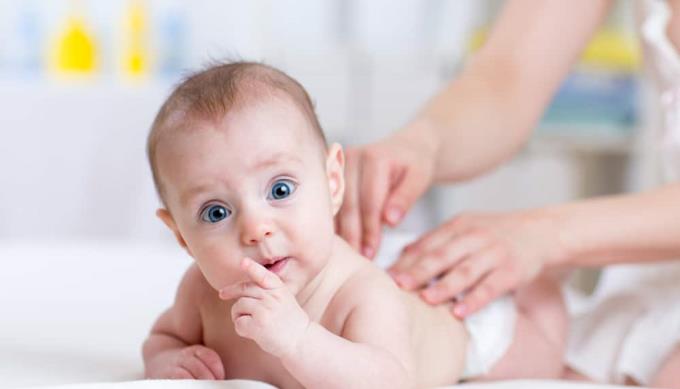Ways to determine an infants caloric needs

Learn how to determine your baby’s caloric needs, including the calories in breast milk and formula, to ensure your infant gets the right nutrition for healthy growth.
Babies with hiccups are a fairly common physiological phenomenon. Although it does not cause much harm to the health, seeing their children encounter this condition constantly makes many parents feel worried. Accordingly, understanding the causes and prevention will help you more easily take care of your baby.
When you are a parent for the first time, you will probably not worry when your baby is constantly hiccuped. Because normally this problem has caused trouble for adults, let alone babies who still cannot speak.
In fact, hiccups are usually harmless, but without intervention, babies are very prone to shortness of breath, vomiting. The article below, aFamilyToday Health suggests you a few tips to deal with this situation.
Hiccups, also known as hiccups, occur when there is an involuntary and interrupted contraction of the diaphragm and intercostal muscles, accompanied by a sudden closure of the vocal cap. This is a fairly common condition in children under 1 year old, even having a baby hiccup while still in the womb.
Accordingly, the fetus can experience this phenomenon from the second trimester onwards due to swallowing amniotic fluid. And at birth, there are 7 main reasons why babies often have hiccups:
Gastroesophageal reflux is a condition in which food goes back from the stomach to the esophagus. Reflux occurs when a newborn has an incomplete lower esophageal sphincter. The lower esophageal sphincter is located between the esophagus and the stomach, preventing food from the stomach from moving back up the esophagus. The reflux of food and stomach acids affects nerve cells, vibrating the diaphragm and leading to hiccups.
Over-feeding can cause the stomach to enlarge and relax. The sudden expansion of the abdominal cavity constricts the diaphragm, making the baby more susceptible to hiccups.

If your baby is bottle-feeding, he or she may swallow too much air because the milk in the bottle flows faster than breastfeeding. Babies swallowing too much air also makes the stomach expand and relax. Too full bottle feeding can cause babies to hiccup and become easily irritated.
Babies may be allergic to ingredients in formula milk or even breast milk, thereby causing inflammation of the esophagus where hiccups are one of the manifestations of this pathology. In addition, many breastfed babies can also be allergic to the foods that mothers consume.
Children with asthma can be caused by a family inheritance (an infected parent or both), are allergic to environmental factors such as air pollution , cigarette smoke, and animal hair. ... even due to respiratory infections .
Once an asthma attack starts, the bronchial tubes become inflamed, restricting the flow of air into the lungs. This causes the baby to wheeze (like a whistle). At this time, the baby's muscles also contract, leading to the baby's hiccups.
The infant's respiratory system is not yet fully developed. When inhaling smoke, a polluted smell or a strong smell, your baby will more likely to cough. If your baby coughs too much, it hurts his diaphragm, leading to hiccups.
Sometimes a drop in temperature can cause a baby's muscles to contract, including the diaphragm. This makes the baby hiccup. If you see your baby appear this way, you should not worry too much. At this point, you need to be calm and understand the causes to deal with these hiccups.
Don't forget to record the time that the baby hiccups. This will be very helpful when you take your baby to the doctor.
According to doctors, overfeeding may be the cause of babies' hiccups. Therefore, you should not bottle or breastfeed too full because this will cause serious stomach effects. In addition, you should keep the following in mind when feeding your baby:
You should feed your baby many small meals a day rather than cramming your baby in one go. This will limit the risk of making your baby hiccup. In addition, mothers also pay attention to breastfeed the right position so that the milk flows into the stomach more easily.
If your baby can sit, let him sit while drinking milk. This will ensure the food goes straight into the stomach with no air in. However, do not forget to sit in the back to support your baby's back.
Listening to music while eating can also cause hiccups. In addition, adjusting the nipples when the baby latches can also reduce the amount of air entering the stomach. When you breastfeed, make sure your baby's mouth is completely closed to the nipple.
Regularly clean your nipples to remove any remaining dry milk residue. If the baby's suckling is interrupted, the baby will accidentally swallow a lot of air into the abdomen, causing the baby to hiccup.
Do not let your baby sleep while bottle feeding. Unlike breast-feeding, bottle-feeding increases your baby's milk intake. This is also considered one of the causes of hiccups.
When bathing children, parents should not let the water temperature too different from the room temperature. In addition, you also need to pay attention to keeping the child's bedroom temperature stable, absolutely avoid opening the air conditioner, fan too big or opening multiple windows at the same time to reduce the risk of children getting cold.
If your baby is in the weaning stage, you can put some sugar under your baby's tongue. For very young babies, you can put some syrup on your pacifier or finger and let the baby suck. However, make sure your fingers and pacifiers are clean at all times! With this simple way, you can stop your child's hiccups.

This is a more direct way to deal with hiccups. Sit your baby upright and gently rub your back in a circle pattern. You can also lay your baby on your tummy and massage it similarly to sitting. Massage gently to make the baby feel comfortable. The massage method helps the baby to stretch the diaphragm and prevent hiccups.
You should keep the baby upright for about 15 minutes after feeding. In addition, patting the back to help your baby burp will help bring air out of the stomach. This relaxes the baby's diaphragm and reduces the chance of hiccups.
You can play peek-a-boo sometimes with your baby. When your baby has hiccups, distract her with active games or shake toys in front of her. Contractions triggered by nerve impulses can trigger hiccups.
There are a number of home remedies for hiccups that are suitable for adults, but they shouldn't be tried with children as it can harm a baby with hiccups like:
Never startle or scare your child. When you have hiccups, a loud, startling bang can help stop your hiccups. However, this in turn affects the baby's eardrum, even injuring the child's spine.
Sour candies can work well for adults in reducing hiccups, but not for children. Even if your baby is more than 12 months old, you should still not offer sour candy or other sour foods to ease hiccups. Most sour sweets contain acids that are not good for your baby's health.
The ligaments in your baby's skeleton are still soft, so any strong impact will be harmful to your baby. Therefore, never pat your baby's back to relieve hiccups.
The muscles that help your baby's eyes move are still developing. Babies do not know how to control their own eyes. Therefore, you should not press the baby's eyeballs even with light pressure.
Babies are very weak so you should not pull bones or tongue to prevent hiccups in your baby. Hiccups are a temporary nuisance that can be resolved. However, if your baby often hiccups, take him to see the doctor.

If your child has chronic hiccups and is constantly belching fluid, this could be a symptom of gastroesophageal reflux usually accompanied by other symptoms including: irritability, back arching, and crying minutes later when eat. If your baby has any of the above signs, take him or her to the doctor immediately.
Babies may hiccup for a while, but if your baby hiccups while suckling, sleeping or playing, it's best to take your baby to the doctor. Chronic hiccups will interfere with all daily activities of the baby and make him uncomfortable.
Children or babies, can hiccups in minutes or hours. If your baby is still comfortable with hiccups, don't worry too much. However, if your baby shows signs of abnormality, this can have serious consequences. At this point, you should look for hiccups in your child to see if he or she is wheezing. If so, you should take your baby to the doctor immediately.
Recently, there are the most basic information about the cause of a baby's hiccups, along with appropriate management directions. Although the hiccups are not very harmful to health, but if the problem occurs in the child continuously for a long time without any signs of remission, it is advised that you immediately take your child to the hospital or the nearest health department for immediate inspection.
Learn how to determine your baby’s caloric needs, including the calories in breast milk and formula, to ensure your infant gets the right nutrition for healthy growth.
Discover the top 5 smartest dog breeds in the world, including Border Collie, Poodle, German Shepherd, Golden Retriever, and Doberman Pinscher. Learn about their unique traits and why they are considered the most intelligent dogs.
Discover 7 nutritious and delicious ways to cook egg porridge for babies, including recipes with cheese, pumpkin, tomato, and more. Learn how to prepare baby-friendly egg porridge with our expert tips.
After a series of medical measures they obtained a complete human vascular system profile.
Watermelon is one of the fruits that many people love, not only cheap but also delicious, nutritious and refreshing in the summer. To get delicious watermelon pieces, show off your housewives, your artistic talents to cut beautiful pieces of watermelon.
aFamilyToday Health - The digestive system and body in each baby is different. Parents need to recognize notes to deal with when babies have a food allergy!
Babies need many factors for perfect development. aFamilyToday Health shares with parents things to keep in mind when babies are 8 weeks old so that parents can take care of their babies the best!
Babies need many factors for perfect development. aFamilyToday Health shares with parents things to keep in mind when babies are 18 weeks so that parents can take care of their babies the best!
Babies need many factors for perfect development. aFamilyToday Health shares with parents things to keep in mind when babies are 28 weeks old so that parents can take care of their babies the best!
Babies need many factors for perfect development. aFamilyToday Health shares with parents things to keep in mind when babies are 32 weeks old so that parents can take care of their babies the best!








